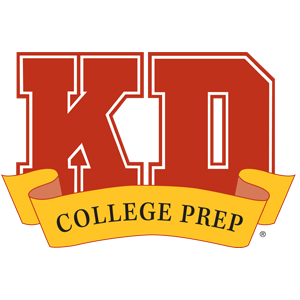“I can’t get into college if I’m not a straight-A student.” “What if I don’t have enough AP classes?” “What if I don’t have enough extracurriculars?”
Take a breath! You’ll be fine. Contrary to popular belief, there is no specific formula that all students must follow in order to get into college. You’ll forge your own unique path to college and beyond. If you’re feeling a bit nervous about your admissions chances, then learning about the truth behind these common college admissions myths can help.
Common Myths About the College Admissions Journey
1. Only straight-A students get into good colleges.
One of the most common college admissions myths is that only straight-A students get accepted. It’s true that good grades can help you get into a good school. However, it’s also true that a straight-A student can still get rejected by a school or two. If you’re not a straight-A student—relax! You could still get into a respected school based on your other strengths. For example, a compelling admissions essay and a strong track record of extracurriculars can work wonders.
2. More extracurriculars are always better.
Speaking of extracurriculars, more are always better… right? Well, not necessarily. Yes, college admissions officers want to see that you’re doing more than the bare minimum of going to class and doing your homework. However, a “strong track record” is more about demonstrating the quality of your involvement and length of commitment. In other words, it’s better to have a couple of extracurriculars that you’ve done for years and perhaps stepped into leadership positions for than listing a dozen after-school clubs with only minimal, brief commitment.
3. It’s fine to skip optional interviews.
Some myths about college admissions involve the interview. You’ll generally have the opportunity to schedule college interviews when you visit campuses. Even though interviews are typically optional, it is indeed best to do them if at all possible. The interview gives the admissions team the opportunity to get to know you as a person, putting a face and a personality to the paperwork. You’ll have the chance to demonstrate your interest in the school and talk about why you want to go there.
Although it’s definitely best to do interviews whenever possible, it’s not the end of the world if you can’t. If you live in Texas and you want to go to school in Alaska, don’t stress out about not being able to make it to campus. (Do note that some schools may offer virtual interviews.)
4. Social media won’t affect college admissions.
It’s hard to make a college application package truly stand out from the crowd. Admissions officers sort through thousands of applications. When they have a pool of candidates who share similar GPAs and extracurriculars, the admissions reps may go on social media to see what sets them apart from one another.
Yes, indeed, social media really can affect your college admissions chances. If you’re on social media, clean up your profile if need be and tighten your privacy settings. Or, instead of making your profile strictly private, you might use it to bolster your admissions chances. Fill your profile with posts that demonstrate a wholesome and inquisitive personality (e.g. pictures of you playing sports, climbing a mountain, volunteering, competing at a science competition, etc.).
5. It’s best to take easy classes to maintain a high GPA.
This is one of the most persistent college admissions myths. Your GPA is certainly important, but admissions reps will also consider the classes you took in high school. If you’ve maintained a 4.0 GPA but only took easy classes, that could count against you. On the other hand, if your GPA slips a bit, but you took a rigorous course load, admissions reps will cut you some slack for not having an exceptional GPA. They’ll appreciate the fact that you challenged yourself.
6. It’s best to take as many AP/IB classes as possible.
Although it’s a good idea to take advanced classes, such as Advanced Placement (AP) and International Baccalaureate (IB) courses, you shouldn’t necessarily take as many as humanly possible. Balance is important. You’ll want to take advanced classes in your stronger areas (e.g. AP History classes if you’re good at history and writing), but you won’t want to take advanced classes that you’ll struggle in—especially if those are the types of subjects you wouldn’t major in as a college student.
7. College admissions planning should start in my senior year.
If you wait until your senior year to start planning for college admissions, then you’re already running late. It’s better to begin in your junior year or—at the very latest—during the summer before your senior year.
We recommend starting early. For more guidance, refer to this recommended college planning timeline.
8. Family responsibilities don’t matter to college admissions officers.
It’s often thought that students shouldn’t include family duties on their college resume or elsewhere in their application. But in fact, demonstrating your family responsibilities can make you stand out and offer a clue to your personality and sense of accountability.
For example, if you were responsible for watching younger siblings, caring for a parent or sick relative, or working on therapy exercises with a loved one with disabilities, then by all means, include that information on your application.
9. Taking the SAT® test is better than the ACT® test (or vice versa).
Over the years, we have heard all kinds of outrageous theories about how one test may be favored over the other. While the two tests are different, the truth is that you won’t get “brownie points” for taking the SAT® test instead of the ACT® test (or vice versa). KD’s recommendation is to plan to take both tests to see which one best aligns with your skillset.
10. Test-optional schools are the same as test-blind schools.
Some schools have minimized the importance of SAT and ACT test scores or ignore them altogether. However, test-optional schools aren’t the same as test-blind schools.
A test-blind school won’t look at scores at all, so there’s no point in submitting them. Test-optional schools don’t require scores, but they’ll still look at them. That means if you don’t submit your scores, you could be at a disadvantage compared to a student who did.
11. College essays need to be completely professional and bland.
Many of the myths about college admissions involve the essay. It’s tempting to make your admissions essay as professional-sounding as possible, but if you beat all creativity out of it, then there’s nothing left of your personality. Remember: Admissions reps are interested in getting to know you—what makes you tick, what motivates you, what you’re passionate about, and what you imagine for your future. They want to know how you triumphed over some hardship or overcame a phobia.
Above all, they want to see authenticity. By all means, get creative with your essay (if you’re a creative type of person). Let your genuine voice shine through. Speak to the essay prompt in a way that shows who you really are as a person.
12. It’s hard to write a strong college essay without an incredible life story.
It’s often thought that a college essay should center on some remarkable, life-changing experience or tragic occurrence. But not everyone has an incredible life story—particularly not before they’re out of their teens—and admissions reps understand this. Instead, choose an angle for your piece that allows you to express your self-identity. What makes you you?
13. Your college essay should cover all of your accomplishments.
Another common college admissions myth is that the essay should detail all of your major accomplishments. However, these are generally included in other parts of your application. Instead, use your essay to cover new ground.
14. Colleges only want exceptional students.
One of the most persistent college admissions myths is that colleges are only interested in admitting exceptional students with a well-rounded resume. What’s a student to do if they aren’t an all-star athlete, musical genius who also conquers science competitions and self-publishes novels in their spare time?
Not to worry! Sure, students who can do a lot of different things are impressive, but colleges are interested in more. They want students who demonstrate a genuine, sustained interest and commitment. A college class of specialists in different areas makes for a well-rounded composition.
15. There’s only one right school for you.
Pretty much everyone uses this phrase: “dream college.” It’s fine to have a top favorite college on your shortlist of possibilities, but don’t think that you can’t possibly be happy anywhere else. There isn’t just one right school for you; there are likely many. Even if you don’t get accepted into your top choice, you’ll undoubtedly find something you love about the school you do end up going to.
16. Private colleges are too expensive.
The sticker price for college these days is downright insane. But that doesn’t mean you shouldn’t even bother to apply to an even pricier private school. You may qualify for federal financial aid and scholarships. In some cases, it can actually be less expensive to attend a private school if you’re offered an impressive financial aid package.
17. I should only apply to top colleges.
If you’re a top student, does that mean you should only apply to top colleges? Actually, these sorts of myths about college admissions can be harmful because they imply that only top colleges can offer a great education and all-around experience.
Yes, you should apply to top colleges if you stand a chance of getting into them, but you shouldn’t limit yourself to just high-rankers. Instead, consider your goals for your future, your preferences, and where you think you’ll be happiest.
18. My parents should pick my college for me.
Everyone has a unique situation, but there’s a good chance your parents will help pay your tuition. This means they should pick the school you go to—right? Well, while parents are entitled to have a say in your decision-making process (and yes, you should at least listen to and consider their opinions), at the end of the day, you are the only one who can make the final decision. It’s your college education, after all, and the next four years of your life. You’re the only one who can make that call.
19. You won’t make money if you major in liberal arts.
It’s true that there are plenty of STEM careers out there with high earning potential. But the myth that liberal arts majors can’t possibly make a decent living is exactly that—a myth. From public relations managers to lawyers to news anchors, there are plenty of well-paying jobs out there for liberal arts majors.
Explore career and salary data on CareerOneStop, sponsored by the U.S. Department of Labor, Employment, and Training Administration.
20. Having perfect grades is more important than being involved.
Lots of college admissions myths involve what admissions reps are looking for. They’re definitely looking for good grades, but they won’t necessarily be impressed by a straight-A student who appears to have never done anything but go to class and do homework. They want to see students who get involved in activities on a meaningful level—whether that means volunteering for the same organization for multiple years in a row or acting in the school’s theatrical productions.
What do colleges look at besides grades?
Aside from getting good grades, there are lots of ways to stand out from the crowd. You can take on some challenging courses, work on getting good test scores, and write a compelling, authentic essay. Gaining work experience, earning recognition, and getting good letters of recommendation are other things college admissions reps will consider.
How do colleges decide who to accept?
Every college establishes its own institutional priorities and admissions criteria. In general, however, admissions reps are looking at characteristics that fall into three categories to determine who to accept:
- Academics
- Extracurriculars
- Personal qualities
Does it matter who writes your letter of recommendation for college?
Yes—and no. One common college admission myth is that getting a letter of recommendation from a high school principal or even a state official is one way to improve your admissions chances. But actually, it’s far better to get a letter from someone who knows you reasonably well. Don’t limit yourself to asking for letters from teachers from whom you received A’s, either. Even if you got a B in their class, a teacher might discuss how you persevered despite the challenging material.
What are common college application mistakes?
There are lots of common college application mistakes! Here are a few:
- Choosing a bland or common essay topic
- Including risky information in your essay (For example, avoid discussing partying, questionable life choices, or romantic relationships.)
- Forgetting to submit a required document along with your application package
- Waiting until the last minute to submit your application
Need help preparing for college admissions?
At KD College Prep, we’re known for our comprehensive test prep programs. But did you know we also offer complete college counseling services? Our college counseling team can guide you through various topics, including exploring majors, planning high school courses, deciding where to apply, writing and editing essays, and more. Contact us today to request a free consultation.














































